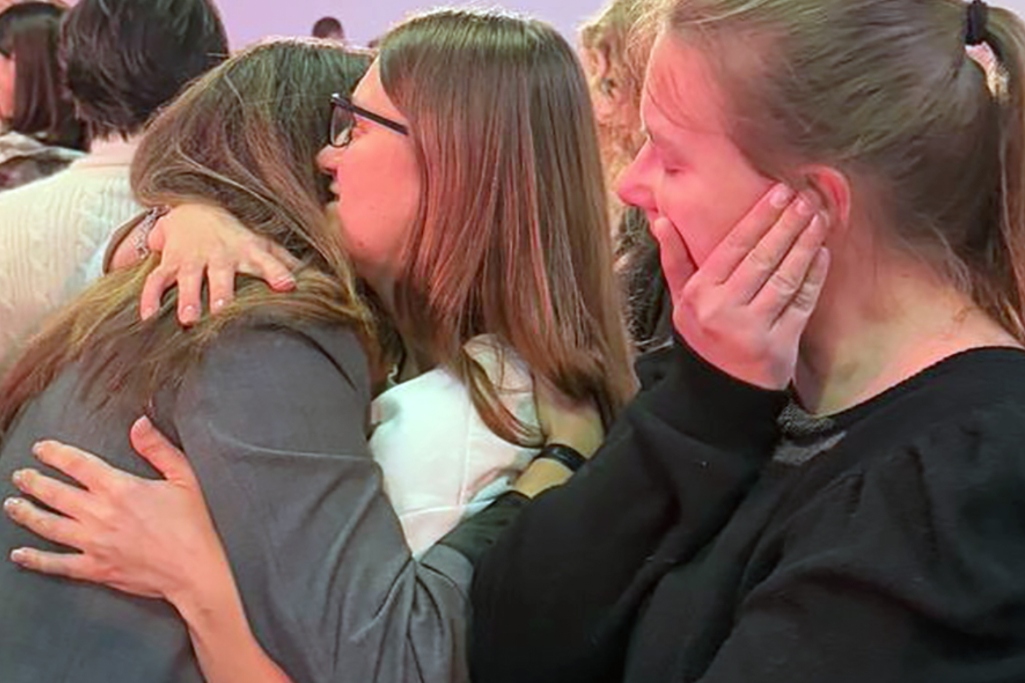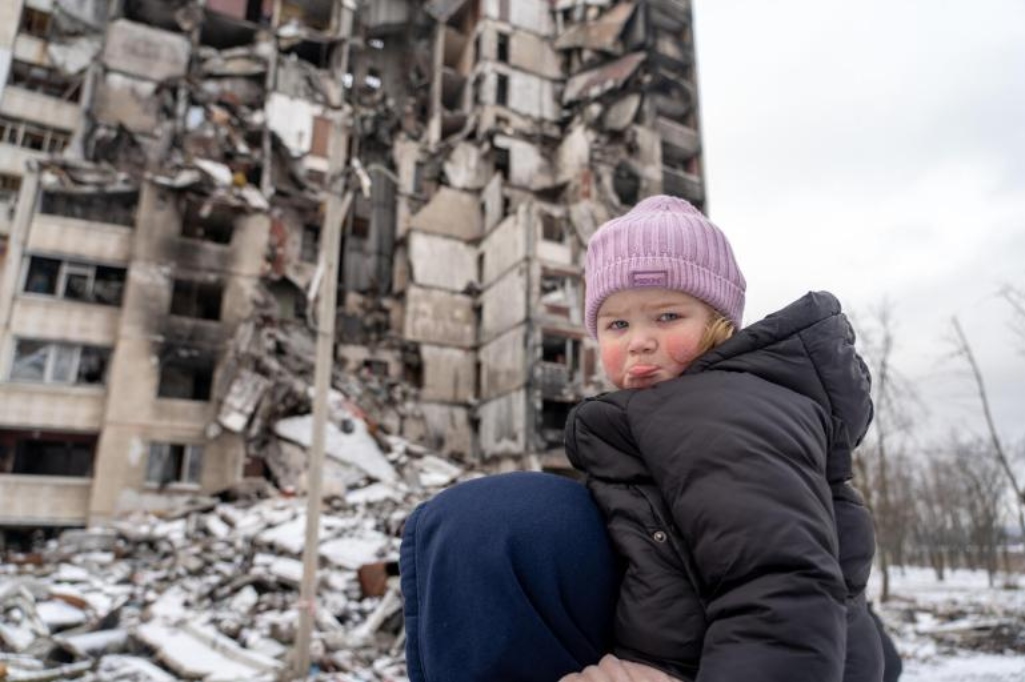
More than 1,000 women in Ukraine recently attended conferences, workshops and seminars designed to offer Christ-centered trauma healing.
More than 1,000 women in Ukraine recently attended conferences, workshops and seminars designed to offer Christ-centered trauma healing.
Leonid Regheta, pastor of River of Life Church in Plano, facilitated the events in Kyiv, Odesa and Kharkiv in his role as Eastern European missions director for Hope International Ministries, with support from Texans on Mission and several Texas Baptist churches.
While wailing sirens warned Ukrainians of approaching drone missiles, and cities experienced rolling blackouts, women gathered from around the war-torn country looking for emotional, psychological and spiritual peace.
“We had a strong prayer team here in the U.S., as well as locally in every place we went to. Sometimes, we had a conference or seminar going on as the prayer teams were uplifting us and asking God for protection,” Regheta said.
“We were able to see how God moved. There were a lot of tears. There were a lot of prayers. There were a lot of hugs. There were a lot of testimonies.”
One woman told Regheta she attended hoping to receive some help in coping, but she never expected the “breakthrough” she experienced.
Over the last three and a half years, Hope International has conducted 10 conferences in countries with large concentrations of Ukrainians — Poland, Germany, Latvia, Italy and Belgium, as well as in Ukraine.
Park Cities Baptist Church in Dallas and LakePointe Church in Rockwall were among the first congregations to provide start-up financial support for Hope International’s trauma healing ministry in Ukraine, Regheta noted.
The trauma healing events follow a “culturally nuanced and accepted format” while also incorporating “best practices” from outside of Ukraine, Regheta said.
Encouraging long-term ministry locally
Rather than bringing in large teams from the United States, Hope International works with local Christian mental health professionals — as well as local churches and pastors — to support their work.
“One of our main approaches to ministry is to encourage long-term, sustainable, efficient ministry locally,” Regheta said.
As part of that emphasis on supporting local churches, Hope International has worked in partnership with the Baptist Union of Ukraine to offer summer retreats for pastors and their families the past two years.
At the same time, while trauma healing events sometimes are scheduled in churches, they often meet in a “neutral site” such as a civic center, making them more accessible and inviting to non-Christian participants.
Mental health professionals who lead sessions follow a “Christ-centered, biblically based approach,” he noted.
“We understand true healing comes from Jesus,” Regheta said. “New life comes from Him.”
He recalled one woman who told him she felt like she was “in the Sahara Desert,” because it seemed as if everything in her experience had become dry and lifeless.
“Sometimes resurrection needs to happen — emotional, spiritual resurrection,” he said. “And that is something only Jesus can provide.”
Prayer constitutes a significant part of the events. While non-Christians are not compelled to receive prayer, “many of them do,” Regheta said.
He recalled praying with some women who lost a husband in the war and others who had a son who was killed. The trauma of living in a nation at war and suffering loss drives some people to seek God, while it drives others to become angry with God or doubt His goodness, he said.
“We come with Jesus to invite others to become closer to Him,” Regheta said.
Hope Trauma Healing Center opens in Kharkiv
In addition to participating in the three events in Kyiv, Odesa and Kharkiv, Regheta joined in the formal opening of the Hope Trauma Healing Center in Kharkiv on Oct. 7.
“We realize there are only so many trips per year we can make. So, why not pray and work on establishing something on the ground locally that will be manned by local psychiatrists, psychologists, trauma healing therapists and Christian volunteers,” Regheta said.
The center, built in partnership with Kharkiv’s mayor and with financial support from Texans on Mission, will provide consistent, localized mental health support to people dealing with trauma.
“It takes time to walk alongside somebody. It takes intentional effort to help them deal with their emotions, with their feelings, with their devastation, with their grief. And it takes time for all that to be processed,” Regheta said.
Rand Jenkins, chief strategy officer for Texans on Mission, sees involvement in trauma healing in Ukraine as part of the mission organization’s decades-long commitment to disaster relief and recovery.
“Texans on Mission is supporting trauma healing work in Ukraine because we recognize that true recovery after war goes beyond physical rebuilding — it requires tending to the mind and soul,” he said.
“In Ukraine, where families are still reeling from the psychological scars of invasion, displacement and loss, we understand that trauma doesn’t fade on its own. It fractures relationships, silences hope and paralyzes communities.”
‘Restoring dignity, rebuilding relationships, rekindling faith’
Texans on Mission works with Hope International Ministries because the two groups share a common commitment to working with pastors and churches in the communities being served.
“These leaders speak the language, understand the cultural context and carry the trust of their people,” Jenkins said.
Rather than “parachuting in solutions,” Texans on Mission and Hope International are “equipping local ministers with trauma-informed care tools so they can walk alongside their congregations with compassion and competence,” Jenkins said.
“Healing trauma isn’t just about counseling. It’s about restoring dignity, rebuilding relationships and rekindling faith amidst brokenness. By empowering local leaders, we are helping to plant sustainable, Spirit-led recovery that will outlive any short-term aid program.”
Jenkins views the work in Ukraine as “a quiet but powerful witness — that even in the darkest valleys, the church can be a place of refuge, restoration and resurrection.”
Regheta expressed appreciation for the support Texas Baptist churches, ministries and individuals have provided. He requested their continued prayers as Hope International seeks to bring comfort to hurting people in Ukraine.
“Pray for the reality of God’s presence in the midst of war, in the midst of grief, in the midst of tragedy and in the midst of trauma,” he said. “We don’t just want to talk about Jesus. We want Jesus to manifest Himself in the midst of what we do.
“We’re trying to do what we can. But we’d rather let Jesus speak through us.”
(EDITOR’S NOTE — This article originally appeared in the Baptist Standard.)


